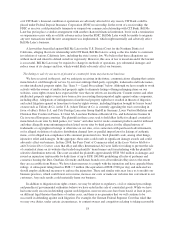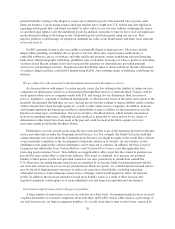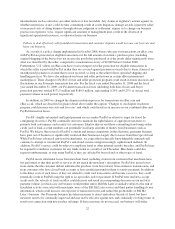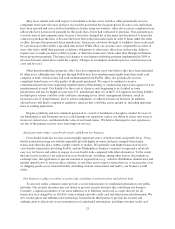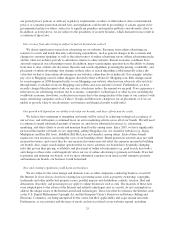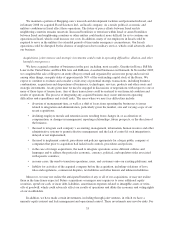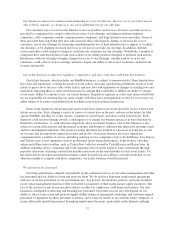eBay 2009 Annual Report Download - page 35
Download and view the complete annual report
Please find page 35 of the 2009 eBay annual report below. You can navigate through the pages in the report by either clicking on the pages listed below, or by using the keyword search tool below to find specific information within the annual report.France, under French law in the recent Louis Vuitton Malletier litigation for transactions on our websites
worldwide that did not involve French buyers or sellers (see “Item 3 — Legal Proceedings” below). Laws
regulating Internet and ecommerce companies outside of the U.S. may be less favorable than those in the U.S.,
giving greater rights to consumers, content owners, competitors, users and other third parties. Compliance may
be more costly or may require us to change our business practices or restrict our service offerings, and the
imposition of any regulations on our users may harm our business. In addition, we may be subject to overlapping
legal or regulatory regimes that impose conflicting requirements on us. Our alleged failure to comply with
foreign laws could subject us to penalties ranging from criminal prosecution to significant fines to bans on our
services, in addition to the significant costs we may incur in defending against such actions.
In light of the global financial crisis, federal lawmakers in Washington, D.C., have discussed the possibility
of overhauling the U.S. financial regulatory system and making significant changes to regulations governing
financial services. In the event that such changes are adopted, they could potentially result in PayPal becoming
subject to one or more federal financial services regulators and eBay Inc. being regulated as a financial services
holding company or could restrict the nonfinancial activities of companies holding financial services companies.
Even if we do not become subject to regulation in the manner described in the preceding sentence, we could be
subject to additional licensure requirements, laws and regulations and increased regulatory scrutiny based on new
or existing businesses, products and offerings, which would impose substantial costs on us and could require us
to change our business practices in ways that would harm our business.
If our Payments business is found to be subject to or in violation of any laws or regulations, including those
governing money transmission, electronic funds transfers, money laundering, counter-terrorist financing,
banking and lending, it could be subject to liability, licensure and regulatory approval and may be forced to
change its business practices.
While PayPal currently allows its customers with credit cards to send payments from 190 markets, PayPal
only allows customers in 65 of those markets (including the U.S.) to receive payments, in some cases with
significant restrictions on the manner in which customers can withdraw funds. These limitations may affect
PayPal’s ability to grow in these markets.
Our Payments business is subject to regulation as a bank in certain jurisdictions. Of the 190 markets whose
residents can use the PayPal service, 31 (27 countries plus four French overseas departments) are members of the
European Union (EU). Since 2007, PayPal has provided localized versions of its service to customers in the EU
through PayPal (Europe) S.A.R.L. et Cie, SCA, a wholly-owned subsidiary of PayPal that is licensed and subject
to regulation as a bank in Luxembourg. Accordingly, PayPal (Europe) is subject to significant fines or other
enforcement action if it violates the disclosure, reporting, anti-money laundering, capitalization, funds
management, corporate governance or other requirements imposed on Luxembourg banks. PayPal has limited
experience in operating as a bank, and any fines or other enforcement actions imposed by the Luxembourg
regulator could adversely affect PayPal’s business. PayPal (Europe) implements its localized services in EU
countries through an expedited “passport” notification process through the Luxembourg regulator to regulators in
other EU member states pursuant to EU Directives, and has completed the “passport” notice process in all EU
member countries. The regulators in these countries could notify PayPal (Europe) of local consumer protection
laws that will apply to its business, in addition to Luxembourg consumer protection law, and could also seek to
persuade the Luxembourg regulator to order PayPal (Europe) to conduct its activities in the local country through
a branch office. Any such responses from these regulators could increase the cost of, or delay, PayPal’s plans for
expanding its business in EU countries. In addition, the EU Payments Service Directive, which established a new
regulatory regime for payment services providers, formally took effect in November 2009. The interpretation of
regulations implementing the EU Payments Service Directive remains uncertain.
In markets other than the U.S., the EU, Australia and China, PayPal serves its customers through PayPal
Private Ltd., a wholly-owned subsidiary of PayPal that is based in Singapore. In many of these markets, it is not
27



